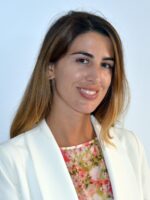
Rosalba Famà is a lawyer and in January 2025 she received a PhD summa cum laude in European Union law from Bocconi University. Her PhD dissertation focused on the EU budget following Covid-19 and the war in Ukraine, and the principle of financial solidarity. She is a research fellow at the Bocconi Lab for European Studies and teaching fellow in European Law at Bocconi University, where she has served as a tutor between 2021-2024. In 2023, her research on European finances earned the recognition of a grant offered by the European Court of Auditors. Rosalba has organized many international conferences, such as three consecutive editions of the Bocconi annual conference “Quo vadis, EU (law)?”. She is a speaker in multiple panels and workshops in several countries, and regularly disseminates her research in newspapers such as the Sole24Ore and L’Avvenire.
Rosalba is passionate about geopolitics and in this context she is a selected member of the Spinelli Forum, Italo-German Young Leaders Dialogue, a project created and sponsored by the Italian and German Foreign Affairs Ministries that boosts strategic dialogues between the Italian and German young generations as one of the objectives of the ‘German-Italian Action Plan for strategic bilateral cooperation and within the EU’. She is also an alumna of the ISPI Future Leader Programme, and currently she also teaches EU law and policy for ISPI, the Italian Institute for International Studies.
Beyond academia, Rosalba is committed to developing a culture of human fraternity, and she cooperates with the “Fratelli Tutti” Foundation for which she contributed to writing the “Vocabolary of Fraternity” and the book “Democracy: the challenge of fraternity”.
Contact: rf2893@nyu.edu
Research Project
- How has the normative scope of the EU’s budgetary balance principle changed?
- What are the legal and constitutional implications of these financial innovations?
- How do these changes interact with other EU principles like solidarity and financial stability?